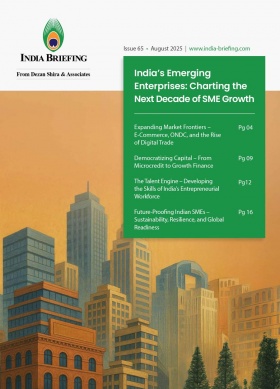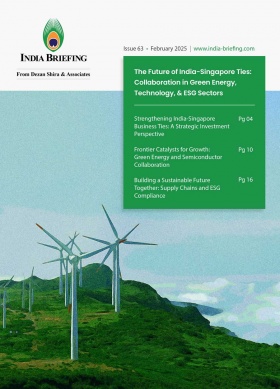India’s Beauty & Personal Care Boom in 2025: Strategic Insights for Global Investors
India’s beauty and personal care industry is set to cross US$48 billion by 2033. The growth is driven by homegrown brands, the entry of global luxury brands, product personalization with immersive tech, and ayurvedic products.
India’s beauty and personal care industry is expanding rapidly, making the country one of the most attractive global markets. In 2024, the Indian beauty and personal care market was valued at US$28 billion. The 2025 market research forecasts show that it could nearly double to around US$48.5 billion by 2033, with compound annual growth rates (CAGR) estimated at 5.6 percent. Another market projection by Statista places India’s beauty and personal care industry’s revenue at US$33.08 billion in 2025, with a CAGR of 3.48 percent through 2030.
Market size and growth potential
The beauty and personal care products market is looking at a boom propelled by urbanization, a rising Indian middle class with higher disposable incomes, and a more health-conscious consumer base.
Within this market, the personal care segment dominates, projected to reach US$14.8 billion in 2025. Consumers are steadily incorporating these products into their daily routines. Per-person revenue is set to rise to US$22.74 in 2025, while online sales and marketing are pushing beauty products deeper into skincare regimens, with digital channels expected to account for 9.4 percent of total revenue by the end of the year.
Demand in the industry is led by skincare and sun care. Sunscreens, moisturizers, and anti-aging creams have become mass-market essentials, particularly among urban consumers.
What’s driving India’s luxury beauty boom
Global beauty houses see India as one of the last major untapped markets, fueled by rising incomes, aspirational consumers, and a growing appetite for premium products. Luxury beauty is among the fastest-growing segments in India’s US$21 billion cosmetics market, though it currently accounts for only 4 percent of the total. At the global level, India’s share remains far lower compared to Southeast Asian countries and developed markets such as China and the US.
To bridge this gap, international brands are ramping up investments in India. Estée Lauder, the American cosmetics giant, is expanding its footprint through brands like Clinique and MAC, while Amorepacific is leveraging the K-beauty trend with customized skincare lines. Shiseido of Japan has introduced its NARS brand through India’s beauty and lifestyle platform Nykaa, while Fenty Beauty has entered the market via partnerships with Sephora and Tira, with plans to open 50 stores across 16 cities. Other premium names such as Kylie Cosmetics, Rare Beauty, and YSL Beauty are also strengthening their presence.
French brands continue to dominate India’s luxury beauty products segment. L’Oréal spans mass, salon, and luxury categories with a portfolio of 15 brands. Similarly, international cosmetics giant Chanel operates seven boutiques across the country, with plans to open two more stores by the end of 2025. Another cosmetics retail brand, Sephora, in collaboration with India’s Reliance Retail, has further expanded to 26 outlets across 13 cities.
Ingredient-focused beauty products preference
Driven by modern trends, there has been a dramatic rise in the demand for natural, organic, Ayurvedic, and ‘not-tested-on-animal’ products. The Indian Ayurvedic products market was valued at US$9.9 billion in 2024 and is projected to grow to US$41.1 billion by 2033, at a CAGR of more than 16 percent.
India’s homegrown brands, Forest Essentials, Biotique, Khadi Natural, and Mamaearth, have capitalized on this shift. They are building their brand identity around ingredient transparency and cruelty-free testing. These are features that resonate with younger buyers.
Personalization has become a key growth driver in India’s beauty market. Customization is now a mainstream expectation, reshaping consumer purchasing behavior. Global brands such as Procter & Gamble and The Ordinary are investing in data analytics to deliver personalized formulations, while e-commerce leaders like Amazon, Flipkart, and Nykaa are deploying AI-driven recommendation engines and subscription models to boost customer engagement and repeat sales.
Sustainability and regulatory pressures
Sustainability has become a decisive factor shaping consumer behavior and corporate strategy. Both regulators and customers are pressuring companies to phase out harmful ingredients, such as microbeads, and adopt stricter measures to address plastic pollution. According to a 2024 PwC survey, global consumers are willing to pay an average 9.7 percent premium for environmentally friendly products, highlighting the market potential for sustainable offerings.
Businesses are responding by investing in eco-friendly packaging solutions and conducting life cycle assessments to monitor greenhouse gas emissions and waste generation. In India, Extended Producer Responsibility (EPR) regulations now make producers accountable for managing packaging waste and contributing to recycling infrastructure, aligning compliance obligations with broader sustainability goals.
Improved recycling outcomes will also depend on consumer participation. By raising awareness about proper disposal practices and the benefits of sustainable packaging, companies can not only support environmental objectives but also enhance brand reputation and customer loyalty.
Conclusion
India’s beauty and personal care industry is in a transformative growth phase, underpinned by rising incomes, urbanization, and evolving consumer preferences. The sector’s expansion is being shaped by four defining trends: the growing presence of global luxury brands, the rise of ingredient-focused and Ayurvedic products, increasing demand for personalization through digital technologies, and heightened emphasis on sustainability and regulatory compliance.
As the market moves toward an estimated value of nearly US$48.5 billion by 2033, companies that adapt to these shifts—by combining innovation with responsible business practices—will be best positioned to capture long-term growth in one of the world’s most dynamic consumer markets.
About Us
India Briefing is one of five regional publications under the Asia Briefing brand. It is supported by Dezan Shira & Associates, a pan-Asia, multi-disciplinary professional services firm that assists foreign investors throughout Asia, including through offices in Delhi, Mumbai, and Bengaluru in India. Dezan Shira & Associates also maintains offices or has alliance partners assisting foreign investors in China, Hong Kong SAR, Vietnam, Indonesia, Singapore, Malaysia, Mongolia, Dubai (UAE), Japan, South Korea, Nepal, The Philippines, Sri Lanka, Thailand, Italy, Germany, Bangladesh, Australia, United States, and United Kingdom and Ireland.
For a complimentary subscription to India Briefing’s content products, please click here. For support with establishing a business in India or for assistance in analyzing and entering markets, please contact the firm at india@dezshira.com or visit our website at www.dezshira.com.
- Previous Article India’s Foreign Direct Investment Tracker 2025
- Next Article Tapping into India’s Tier 2 and Tier 3 Cities: A Practical Playbook for Foreign Investors








